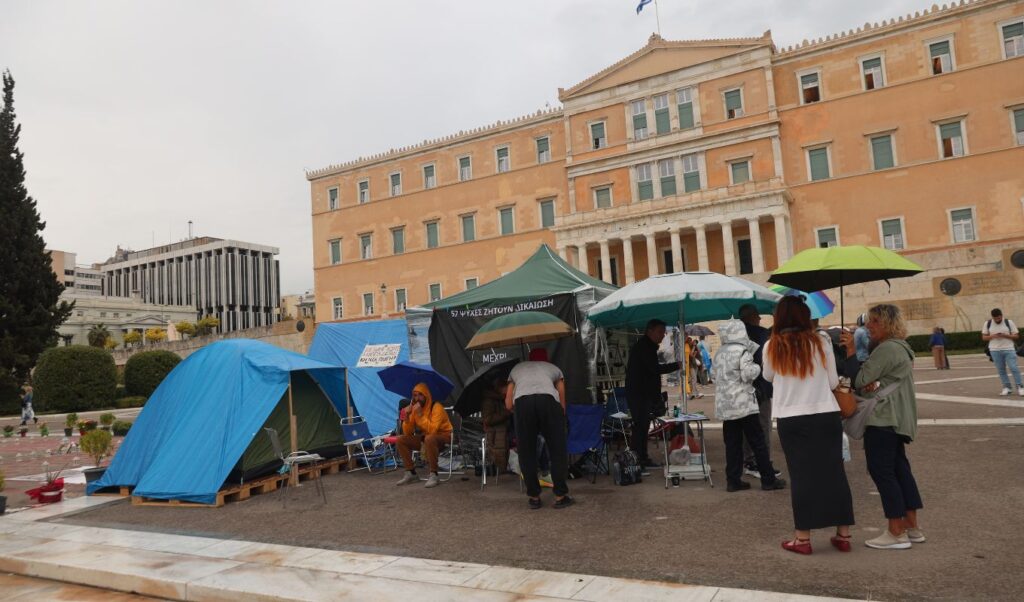High political tension and reactions from opposition parties and MPs were triggered by the government’s announced legislative regulation regarding the Tomb of the Unknown Soldier, which was part of the Maximos Mansion’s original targeting strategy: to highlight this initiative following a period of public and anonymous reactions regarding the uses that should ultimately be permitted around the historic monument. The deeper goal is to continue the gradual reconnection with part of the more right-wing audience, which electorally moved toward Greek Solution, Victory, and Voice of Reason in the European elections.
In his customary Sunday weekly review on Facebook, Kyriakos Mitsotakis referred to the judicial vindication of Panos Routsis’s claims, while noting that “simultaneously, the trial for the tragic Tempe accident begins, leaving exposed those who tried to turn the case into a cheap partisan celebration.”
He then analyzed his reasoning regarding the section of Syntagma Square between Amalia Avenue and Parliament, where the Tomb of the Unknown Soldier is located. “Can a historic monument like the Tomb of the Unknown Soldier become a venue for events unrelated to its mission? My answer is no. Especially when all citizens can express themselves freely in thousands of other spaces through gatherings or demonstrations,” the Prime Minister noted and announced his decision: “That’s why the government decided to untangle the web of shared responsibilities around the protection and maintenance of this unique Athens landmark. With legislative regulation next week, it assigns exclusive responsibility for the protection and proper functioning of the Tomb of the Unknown Soldier where it belongs: to the Ministry of National Defense.”
What the legislative provision for the Tomb of the Unknown Soldier will cover
Government sources later clarified that law enforcement measures remain under the jurisdiction of the Greek Police and that the Ministry of National Defense will have responsibility for protection, maintenance, and cleanliness of the monument. In a subsequent post, Minister of State Akis Skertsos analyzed what this notorious regulation will contain. He first mentioned that the bodies with shared responsibility in one way or another for protecting the Monument are the Greek Parliament in whose space the Monument is housed, the Presidential Guard of conscript Evzones who are responsible for guarding the Monument but not the space in front of it, the Ministry of Culture through the relevant directorate for conservation of ancient and modern monuments, and the Municipality of Athens which has responsibility for cleaning the area in front of the monument. The legislative provision to be submitted in the coming days, according to what Mr. Skertsos wrote, will contain the following changes:
– It abolishes the multiple responsibilities that often lead to inaction and decision-making gaps when the sanctity of the space is threatened, and transfers them all to one body, which is the Ministry of National Defense.
– It institutionally establishes, for the first time, the characterization of the Tomb of the Unknown Soldier as a monument of absolute protection and respect.
– It designates as a protection zone the monument itself as well as the 4,500 square meter area in front of it, while simultaneously allowing the exercise of the right to peaceful protest in the entire space extending from Amalia Avenue to the lower side of Syntagma Square.
“Anyone who wants to demonstrate, protest, or organize events has almost all the rest of Greece to do so! Is it necessary for all kinds of protests to be organized at a sacred monument of the country?” wondered Deputy Prime Minister Kostis Hatzidakis in his own post, who declared himself astonished by the reactions of opposition parties and certain analysts and called on them to show more self-restraint and less partisan fanaticism.
It’s worth noting that today Kyriakos Mitsotakis, together with Foreign Minister Giorgos Gerapetritis, will travel to Egypt, where the “Sharm El-Sheikh Peace Summit” will take place, following an official invitation from US President Donald Trump. “Greece is one of the European countries that will be there, along with Cyprus. Our presence is yet another response to those who want to see a Greece isolated and miserable,” Mr. Mitsotakis noted, emphasizing that “the agreement constitutes a historic moment, as for the first time a realistic prospect for peace in the broader region is being created.”




